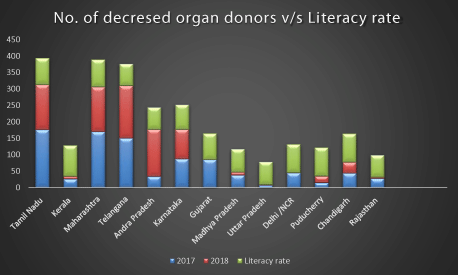Archives of Organ Transplantation
Decoding Cultural Obstructions in Way of organ Transplants
Varsha Gautam*
Cite this as
Gautam V (2020) Decoding Cultural Obstructions in Way of organ Transplants. Arch Organ Transplant 5(1): 011-013. DOI: 10.17352/2640-7973.000016Apart from basic language, different aspects of an individual’s culture can play its role in literacy and influence the ability of health workers to comprehend and follow instructions. The most critical goals for patients after organ transplantation are to optimize health and wellness. Low health literacy has significant health and well-being implications and increased risk to patients for negative health outcomes. The definition of death and especially brain death is a major issue in organ transplantation. The internal tendency of a particular society to donate organs is another major factor. The organ theft, organ transfers, the fragile balancing of live contributions between the recipient’s benefit and potential loss to the donor and others are among the crucial ethical concerns that require active intervention. In the following study, we address the several cultural challenges facing donation of organ around the world , and is literacy the reason of less organ transplants, particularly in India.
Introduction
In the middle of the chaos when the surgeon says the only way to guarantee your survival is by transplanting an organ is a ray of hope that shines through the entire body. In reality, circumstances are regulated, but psychological uncertainty exist both before and after surgery. The same was true for Rehmaan, who was diagnosed with a heart transplant last year. Rehmaan was psychiatrically recovered; he was mentally impaired, however, and now struggles for his sense of identity. Organ transplants will certainly add years to a person’s drowning lives, but the same mental stresses must also be faced in these years, either before or after treatments. This emotional instability is always difficult to deal with and can lead to breakdowns of individuals. Besides these the culture backgrounds of the person too affect them mentally, if the recipients hails from an uneducated family or are uneducated themselves, receives various setbacks about how to deal with the idea of having another person’s organ in to their own body. The traditional and cultural beliefs challenges both recipient (person receiving the organ) and donor (person donating the organ) along with their families. In our view, the cultural context in organ donation treatments plays an significant role in awareness and belief in various cultures.
Cultural backgrounds encompasses a major role in complete wellbeing of a recipient. Although, not denying to the higher risk of complications during surgeries, sometimes it becomes very difficult to make the recipient’s family agree on the treatment, especially if the family is not well qualified or due to lack of knowledge to understand the complex issues. The pre- treatments challenges the patient mentally and held them confuse about getting fitted an organ from another person in to their own bodies. Several queries make way to their mind example sensing a body’s own organ loss, sensing death, wwdietary changes, physical complications, pharmacological side effects, anxiety and depression, sexual problems, family or cultural norms [1]. The improvements in organ transplants and the post treatment changes ( physical, emotional and social effects) leading to psychological alterations in the organ recipient shares a directly proportional relationship. A great psychological void created by the transplant is the loss of the integrity of recipient’s body image. There is a long and complicated way to regain one’s full identity, and an entire body image needs to be regained. The complete acceptance of the donor organ by the recipient’s body is crucial even after the surgery. But if the psychological changes continues to create anxiety and other issues that might lead to major consequences [2]. These situations accounts more significant role from family and relatives, and if in case the family turns incapable of handling and understanding the post treatments effects the person can run in to further depression or anxiety issues [3]. Whereas in case of well-educated family backgrounds, family understands the situation well and keep a pace with pre and post-treatment changes in the recipient nature. These cultural differences arrives due to socio-economic barriers in the society and effects the organ transplantation directly as well as indirectly.
Transplants and cultural believes
Transplantation cultural beliefs are complex. Some cultures owe ancient rituals and beliefs of great importance. They claim that the spirit from the donor is transmitted to the recipient and special ceremonies are performed for this process. For instance, Asians have a comparatively greater negative attitude towards organ donations than other American residents. In some cultures, organ transplantation meant a completely new person and death of the person before treatment while, in some cultures organ transplantations considered as a boon to the survival of mankind and is practiced undoubtedly [4]. As far as some cultures are known to believe in the fact that the donor could no longer rest in peace after donating a certain organ from the body. Another major cultural obstruction is the ‘definition of dead’ in some societies. According to medical terminologies if a person’s brain is not working the person is declared dead (brain-death) and could be a potential donor.. Some cultural beliefs says, the person is declared dead only if all organ functioning (brain and heart both) comes to the end [5]. In Japan, Shinto, a national religious belief in preserving a dead body fully and any destruction of the body is a crime [6]. These cultural differences of opinions among groups had led to the non-rapid increase in organ transplantation surgeries and they still remain questionable. Low literacy is in direct correlation with having orthodox mindset majorly. In the view of the highlighted facts mentioned above, cultural beliefs are not only preventing organ transplant surgeries to proceed but also creating panic in the minds of society. They are definitely the breakers in the way of advancements in medical fields. There could be numerous ways to overcome the situation that is awakening the society against taboos about organ transplants. Developing a sense of saving mankind if they are offered a chance will not only save many lives but will definitely make people proud of their contribution to the world. Another step that could include the role of medical practitioners and staff [7]. They could make the families of both potential donors and recipients understand by acknowledging them with the various facts of undergoing the surgery. Family members of the recipients could be made understood about all the dimensions of organ transplantation, before and after effects, so that the families with a lack of knowledge could understand the situation well and can make better decisions. To overcome the psychological changes during pre and post-treatment special therapies should be provided by practitioners to do away with the situations of anxiety, pressures, confusion and to make the body of the recipient completely accept the donor’s organ [8]. Although the awareness campaigns are being carried out but still the transplantation demands is much more in comparison to the number of potential donors. There are a lot of scopes in the field of organ transplantations but the speed is much less and cud only be overcome by creating broad windows in minds of narrow-minded people who give more importance to cultural beliefs then the survival of mankind.
Literacy versus organ transplants
Methodology: Literacy rate of various states in India is collected and was correlated with the decrease in number of organ transplants. The following observations based on state wise data in India is shown in chart below. This data can be conveniently linked to the wise state of literacy in India versus no. of decrease in organ donors. As higher literacy rates showed fewer declines in the number of organ donors compared with lower literacy rates in the states with a more decline in the number of organ donors. There is an orthodox attitude behind organ transplants in states with lower literacy rates. This cultural blockage is a very destructive strategy for the next era where organ transplants would be a surviving strategy for many Figure 1.
Conclusion
Organ transplantation is a safe process that provides thousands of people with new hope and new lives. The development and advancements of organ transplants is significantly influenced by the dynamic interplay between the cultural and psychological dimensions of organ transplantation therapies. However, there are many people like Rehmaan who might struggle with emotional and mental setbacks after undergoing transplant, which could be overcome through therapies but their extended life is all that matters in the end. The extended lives of people like Rehman and many successful surgeries are proof that medial advancements are trying their best to save mankind even though some cultural beliefs holding them back. They are possible to resolve if we educate our youth with reverence and compassion, engage our cultural and religious leaders, promote family conversations and demonstrate the goodness of organ donation. It is therefore concluded that cultural beliefs significantly affect the number as well as the success of organ transplantation surgeries.
- Kaba E, Thompson DR, Burnard P, Edwards D, Theodosopoulou EJ (2005) Somebody else's heart inside me: a descriptive study of psychological problems after a heart. Issues Ment Health Nurs 26: 611-625. Link: https://bit.ly/3nWIGLP
- Di Matteo G, De Figlio A, Pietrangelo T (2018) The psychological dimension of organ transplant patients: Mini review. Link: https://bit.ly/3fw2Uco
- Haugh KH, Salyer JJH (2007) Needs of patients and families during the wait for a donor heart. Heart Lung 36: 319-329. Link: https://bit.ly/2UU7JCv
- Eshraghian A (2013) Religion, Tradition, Culture, and solid organ transplantation 41: e134. Link: https://bit.ly/3l2YdI1
- Truog RD, Robinson WM (2003) Role of brain death and the dead-donor rule in the ethics of organ transplantation. Crit Care Med 31: 2391-2396. Link: https://bit.ly/2UYPNGV
- Mostafazadeh-Bora M, Zarghami A (2017) Cultural and religious issues in organ transplantation: Crucial role in multiethnic countries. Saudi J Kidney Dis Transpl 28: 188-189. Link: https://bit.ly/3pXaFg8
- Flayou K, Kouam N, Miara H, Raoundi O, Ouzeddoun N, et al. (2016) Attitudes toward organ donation among personnel from the University Hospital of Rabat. Saudi J Kidney Dis Transpl 27: 758-761. Link: https://bit.ly/39cwfHG
- Marshall PA, Daar AS (1998) Cultural and psychological dimensions of human organ transplantation. Ann Transplan 3: 7-11. Link: https://bit.ly/3lZVf8o
Article Alerts
Subscribe to our articles alerts and stay tuned.
 This work is licensed under a Creative Commons Attribution 4.0 International License.
This work is licensed under a Creative Commons Attribution 4.0 International License.


 Save to Mendeley
Save to Mendeley
